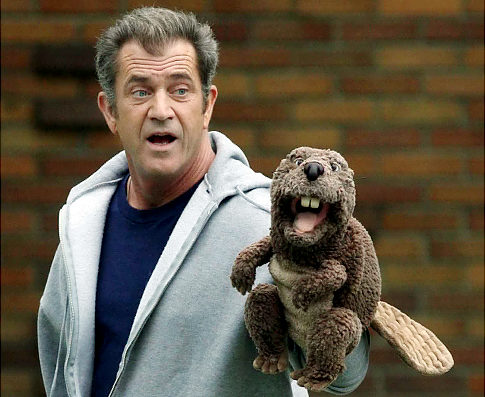Sometimes when a star misbehaves in public, a perfectly blameless movie takes the hit. Such appears to be the case with The Beaver, an independent drama that so far has had trouble drawing viewers. The studio’s spin is that between the movie’s difficult subject matter and its unorthodox approach, it would have been a tough sell regardless of who was starring in it. That may be true. All the same, it’s hard to watch Mel Gibson in this movie without remembering the actor’s reprehensible offscreen behavior.
We’re reminded of it in a troubling scene early on when he’s seen walking out of a liquor store with a case full of bottles and another one later when his son (no doubt speaking for some in the audience) tells him, “When I was little, I wanted to be just like you. When I got older, I wanted to be like anyone else.” If you find Gibson’s offscreen behavior so repellent that you’ll never watch another film of his, I have nothing to offer in his defense. As for the movie that he’s currently in, it’s not great by any means, but it’s got enough odd edges and corners to catch the eye.
 Gibson portrays Walter Black, a man in the depths of severe depression who has already tried numerous forms of therapy without success. After being tossed out by his wife Meredith (Jodie Foster) and making a botched suicide attempt in a hotel room, Walter experiences a breakthrough from a discarded beaver hand puppet. Through the puppet, Walter talks to himself — and eventually the rest of the world as well — in a Michael Caine-like Cockney accent. The puppet restores him to functionality, repairing his marriage somewhat and even turning around his business, a prosperous toy company, inherited from his father, that Walter had been running straight into the ground.
Gibson portrays Walter Black, a man in the depths of severe depression who has already tried numerous forms of therapy without success. After being tossed out by his wife Meredith (Jodie Foster) and making a botched suicide attempt in a hotel room, Walter experiences a breakthrough from a discarded beaver hand puppet. Through the puppet, Walter talks to himself — and eventually the rest of the world as well — in a Michael Caine-like Cockney accent. The puppet restores him to functionality, repairing his marriage somewhat and even turning around his business, a prosperous toy company, inherited from his father, that Walter had been running straight into the ground.
The beaver does more than bring Walter out of his shell. It has a salutary effect on the movie as a whole, injecting some badly needed lightness and humor into a potentially grim subject. (“I understand if some of you are skeptical,” the beaver tells Walter’s employees at a staff meeting. “I’ve got a middle-aged man’s left arm stuck up me bum. Why wouldn’t you be?”) The movie’s portrayal of mental illness resists easy Hollywood clichés. We’re never given a definite cause for Walter’s condition, though his father’s death appears to have been a trigger point. Kyle Killen’s script never deludes itself into thinking that the puppet is anything like a permanent cure. Indeed, Walter becomes unstable and violent, and the beaver becomes a malign force late in the film and takes on a menacing appearance. It leads to a fight between Walter and the beaver that must be the weirdest such scene that Mel Gibson has ever taken part in. (A Mel Gibson movie just isn’t complete without his being beaten to a bloody pulp, and the fact that he’s doing it to himself here just fits with his self-flagellating tendencies.)
With all this, why does the movie feel so slender? The undercooked supporting characters might be an answer. Meredith is yet another standard-issue supportive wife familiar to movies like these, and why Foster would cast herself in such a role, I’m sure I don’t know. Meredith’s love for Walter is supposed to be one of the story’s emotional focal points, yet the chemistry between Foster and Gibson is weak. (A flashback showing the couple together in happier times might have helped.) There’s more going on with Walter’s angry high-school senior son Porter (Anton Yelchin), who’s acting out by needlessly jeopardizing his future writing fellow students’ term papers for cash. This character is a chance to shed light on the collateral damage that mental illness can do to family members, but the movie fumbles it. Yelchin does pair nicely with Jennifer Lawrence (Winter’s Bone) as a valedictorian cheerleader hiding an artistic streak, but the romance feels like it belongs in a different movie. The odd plotline in which Walter and the beaver briefly become pop-culture celebrities is a wrong turn — the movie aims for satire and misses.
This is Jodie Foster’s third film as a director and her first as such in more than a decade. Her direction has become highly technically proficient — just check out the neatly turned opening montage of Walter undergoing various ineffective therapies. When it comes to emotions, though, she’s all at sea. As with her other two movies (the kid-prodigy drama Little Man Tate and the Thanksgiving comedy Home for the Holidays), Foster seems to wave a magic wand and wish away all the characters’ issues to give us a happy ending. That feels grossly inappropriate here, in light of the gruesome violence that ends Walter’s relationship with the beaver. The Beaver’s darkest moments make it more truthful about mental illness than many other movies on the subject. Too bad its lightest moments make it easy to dismiss.
The Beaver
Starring Mel Gibson and Jodie Foster. Directed by Jodie Foster. Written by Kyle Killen. Rated PG-13.











